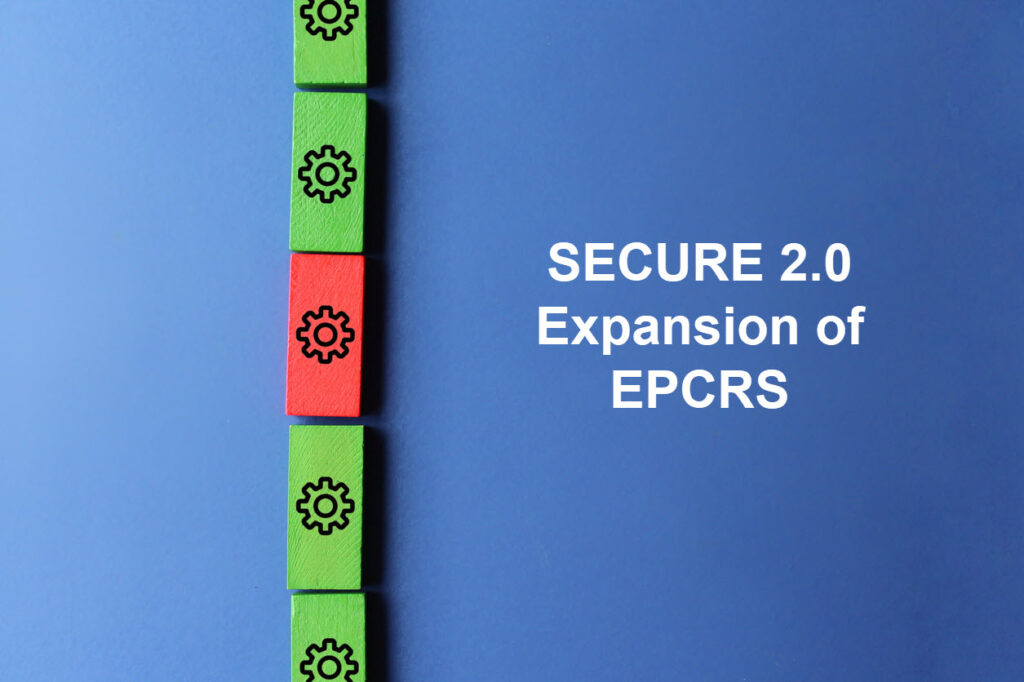On May 25, 2023, the Internal Revenue Service (IRS) provided new interim guidance with Notice 2023-43 for plan sponsors participating in self-correction through the Employee Plans Compliance Resolution System (EPCRS). This notice provides guidance and clarity with respect to the expansion of EPCRS for plan failures under section 305 of the SECURE 2.0 Act.
SubscribeWhat is EPCRS?
The Employee Plans Compliance Resolution System (EPCRS) is in place to fix mistakes in a retirement plan so that plan sponsors can avoid plan disqualification. There are three ways to correct mistakes under EPCRS, according to the IRS:
- Self-Correction Program (SCP) – Plan sponsors are permitted to correct certain plan failures without contacting the IRS or paying a fee.
- Voluntary Correction Program (VCP) – Plan sponsors are permitted to pay a fee and receive IRS approval for correction of plan failures (any time before a plan audit).
- Audit Closing Agreement Program (Audit CAP) – Plan sponsors are permitted to pay a sanction and correct a plan failure while the plan is under audit.
Revenue Procedure (Rev. Proc.) 2021-30
The current EPCRS program is laid out in Rev. Proc. 2021-30. Historically, Rev. Proc. 2021-30 provided that, under SCP, a plan sponsor of a qualified plan or 403(b) plan generally may self-correct certain significant operational failures and plan document failures by the last day of the third plan year following the plan year for which the failure occurred. Certain failures were also excluded from self-correction, such as plan document errors, loan failures, and eligibility failures.
SECURE 2.0 Expansion of EPCRS
SECURE 2.0 expands the ability for plan sponsors to make self-corrections proactively. Under the law, a plan sponsor may correct any “eligible inadvertent failure” at any time. An “eligible inadvertent failure” is generally a failure that:
- Is not identified by the IRS prior to any actions demonstrating a specific commitment to implement a self-correction with respect to the failure
- For which the self-correction is completed within a reasonable period after the identification of the failure
- Is not egregious
- Does not involve the misuse or diversion of plan assets
- Does not directly or indirectly relate to an abusive tax avoidance transaction
- Occurs despite the existence of established and routinely followed practices and procedures reasonably designed to promote and facilitate compliance with the applicable requirements of the Internal Revenue Code
Updated Guidance – Notice 2023-43
The Notice explains that plan sponsors can begin self-correcting certain eligible inadvertent failures (subject to certain limitations outlined in the notice) before EPCRS has been updated. Congress (in SECURE 2.0) instructed the IRS to update Rev. Proc. 2021-30 no later than two years after the date of enactment (December 29, 2024.) However, there are several eligible inadvertent failures that a plan sponsor may not self-correct before the date Rev. Proc. 2021-30 is updated. Such failures include:
- Failure to adopt the initial written plan
- Orphan plan failures
- Significant failure in a terminated plan
- Demographic failure corrections that do not meet the requirements of existing law (coverage, nondiscrimination, participation testing)
- Operation failures corrected by amendment resulting in less favorable benefits to participants
- ESOP failure involving tax consequences other than plan disqualification
Defining a “Reasonable Period” for Self-Correction
The notice clarifies that self-correction needs to be completed within a reasonable period after the failure is identified. The majority of eligible inadvertent failures will be considered corrected within a reasonable period if corrected by the last day of the 18th month following identification of the failure.
An eligible inadvertent error may be self-corrected before being identified by the IRS and may even be self-corrected post-identification if the plan sponsor can demonstrate “specific commitment to implement a self-correction,” which includes:
- Specific identification of failure; and
- Actively pursuing correction
Correcting Plan Errors Moving Forward
It is important to note that Notice 2023-43 provides guidance and is not the final rule. Plan sponsors, along with their service providers, should continue to review and monitor the administration of their plan. If a mistake has been made, documenting each step of the correction process that explains the failure and why a corrective action was taken is important. Having procedures in place will be helpful in case the plan is ever audited down the road.
TRI-AD and our Associates’ suggestions or recommendations shall not constitute legal advice. No content on our website can be construed as tax or legal advice and TRI-AD may not be considered your legal counsel or tax advisor. Clients are encouraged to consult with their tax advisor and/or attorney to determine their legal rights, responsibilities, and liabilities. This includes the interpretation of any statute or regulation, federal, state, or local; and/or its application to the clients’ business activities.

